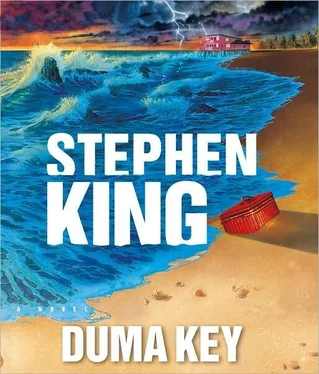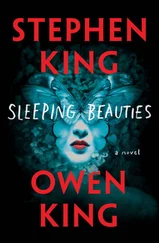Wireman glanced at the declining sun, then at his watch. “Does this have any bearing on our current situation, muchacho ? I assume it does.”
“You bet.” I produced a drawing of a keg with a fat screw-lid bung on top. The word TABLE had been sketched in a semicircle on the side, with SCOTLAND below it, in another semicircle. It was ragged work; I drew far better than I printed. “Whiskey, gents.”
Jack indicated a vague, humanoid scribble on the keg between TABLE and SCOTLAND. The figure had been executed in orange, and one foot was raised behind it. “Who’s the chick in the dress?”
“That’s not a dress, it’s a kilt. It’s supposed to be a highlander.”
Wireman raised his shaggy brows. “Won’t win any awards for that one, muchacho .”
“Elizabeth put Perse in some sort of midget whiskey barrel,” Jack mused. “Or maybe it was Elizabeth and Nan Melda—”
I shook my head. “Just Elizabeth.”
“How big was this thing?”
I held my hands about two feet from each other, considered, then moved them a little farther apart.
Jack nodded, but he was frowning, too. “She put the china figure in and screwed the cap back on. Or put the plug in the jug. And drowned Perse to sleep. Which seems fucked up to me, boss. She was underwater when she started calling to Elizabeth, for God’s sake. On the bottom of the Gulf!”
“Leave that for now.” I put the sketch of the whiskey barrel on the bottom of the stack and showed them the next one. It was Nan Melda, using the telephone in the parlor. There was something furtive about the tilt of her head and the hunch of her shoulders, only a quick stroke or two, but it said all that needed to be said about how southern folk felt back in 1927 about black housekeepers using the parlor phone, even in an emergency.
“We thought Adie and Emery read about it in the paper and came back, but the Atlanta papers probably didn’t even cover the drowning of two little girls in Florida. When Nan Melda was sure the twins were missing, she called Eastlake — the Mister — on the mainland to give him the bad news. Then she called where Adie was staying with her new husband.”
Wireman pounded his fist on his leg. “Adie told her Nanny where she was staying! Of course she did!”
I nodded. “The newlyweds had to’ve caught a train that very night, because they were home before dark the next day.”
“By then the two middle daughters must have been home, too,” Jack said.
“Yep, the whole family,” I said. “And the water out there…” I gestured toward where the slim white ship rode at anchor, waiting for dark. “It was covered with small boats. The hunt for the bodies went on for at least three days, although they all knew those girls had to be dead. I imagine the last thing on John Eastlake’s mind was trying to figure out how his eldest daughter and her husband got the news. All he could think during those days was his lost twins.”
“THEY ARE GONE,” Wireman murmured. “Pobre hombre.”
I held up the next picture. Here were three people standing on the veranda of Heron’s Roost, waving, as a big old touring car motored down the crushed shell driveway toward the stone posts and the sane world beyond. I had sketched in a scattering of palms and some banana trees, but no hedge; the hedge did not exist in 1927.
In the rear window of the touring car, two small white ovals were looking back. I touched each in turn. “Maria and Hannah,” I said. “Going back to the Braden School.”
Jack said, “That’s a little cold, don’t you think?”
I shook my head. “I don’t, actually. Children don’t mourn like adults.”
Jack nodded. “Yeah. I guess. But I’m surprised…” He fell silent.
“What?” I asked. “What surprises you?”
“That Perse let them go,” Jack said.
“She didn’t, not really. They were only going to Bradenton.”
Wireman tapped the sketch. “Where’s Elizabeth in this?”
“Everywhere,” I said. “We’re looking through her eyes.”
“There’s not much more, but the rest is pretty bad.”
I showed them the next sketch. It was as hurried as the other ones, and the male figure in it was depicted back-to, but I had no doubt it was the living version of the thing that had clamped a manacle on my wrist in the kitchen of Big Pink. We were looking down on him. Jack looked from the picture to Shade Beach, now eroded to a mere strip, then back to the picture. Finally he looked at me.
“Here?” he asked in a low voice. “The point of view in this one is from right here?”
“Yes.”
“That’s Emery,” Wireman said, touching the figure. His voice was even lower than Jack’s. Sweat had sprung up on his brow.
“Yes.”
“The thing that was in your house.”
“Yes.”
He moved his finger. “And those are Tessie and Laura?”
“Tessie and Lo-Lo. Yes.”
“They… what? Lured him in? Like sirens in one of those old Greek fairy tales?”
“Yes.”
“This really happened,” Jack said. As if to get the sense of it.
“It really did,” I agreed. “Never doubt her strength.”
Wireman looked toward the sun, which was nearer the horizon than ever. Its track had begun to tarnish at last. “Then finish up, muchacho, quick as you can. So we can do our business and get the hell out of here.”
“I don’t have much more to tell you, anyway,” I said. I shuffled through a number of sketches that were little more than vague scribbles. “The real heroine was Nan Melda, and we don’t even know her last name.”
I showed them one of the half-finished sketches: Nan Melda, recognizable by the kerchief around her head and a perfunctory dash of color across the brow and one cheek, talking to a young woman in the front hallway. Noveen was propped nearby, on a table that was nothing but six or eight lines with a quick oval shape to bind them together.
“Here she is, telling Adriana some tall tale about Emery, after he disappeared. That he was called suddenly back to Atlanta? That he went to Tampa to get a surprise wedding present? I don’t know. Anything to keep Adie in the house, or at least close by.”
“Nan Melda was playing for time,” Jack said.
“It was all she could do.” I pointed toward the crowding jungle overgrowth between us and the north end of the Key, growth that had no business being there — not, at least, without a team of horticulturalists working overtime to provide its upkeep. “All that wasn’t there in 1927, but Elizabeth was here, and she was at the peak of her talents. I don’t think anyone trying to use the road that went off-island would have stood a chance. God knows what Perse had made Elizabeth draw into existence between here and the drawbridge.”
“Adriana was supposed to be next?” Wireman asked.
“Then John. Maria and Hannah after them. Because Perse meant to have all of them except — maybe — Elizabeth herself. Nan Melda must have known she could only hold Adie a single day. But a day was all she needed.”
I showed them another picture. Although much more hurried, it was once again Nan Melda and Libbit standing in the shallow end of the pool. Noveen lay on the edge with one rag arm trailing in the water. And beside Noveen, sitting on its fat belly, was a wide-mouth ceramic keg with TABLE printed on the side in a semicircle.
“Nan Melda told Libbit what she had to do. And she told Libbit she had to do it no matter what she saw in her head or how loud Perse screamed for her to stop… because she would scream, Nan Melda said, if she found out. She said they’d just have to hope Perse found out too late to make any difference. And then Melda said…” I stopped. The track of the lowering sun was growing brighter and brighter. I had to go on, but it was hard now. It was very, very hard.
Читать дальше










